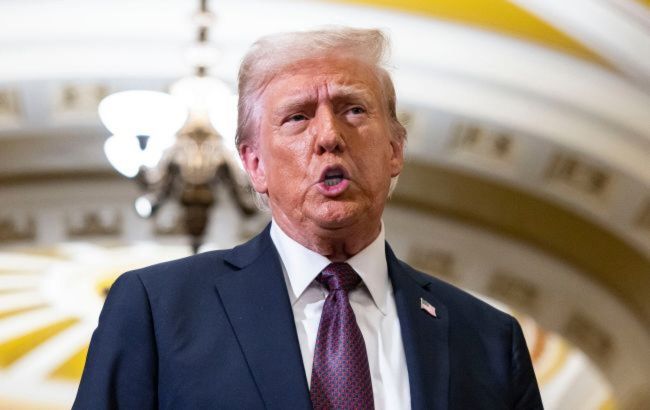Migrants in US face daily fines and asset confiscation - Reuters
 Photo: Donald Trump, President of the United States (Getty Images)
Photo: Donald Trump, President of the United States (Getty Images)
The administration of US President Donald Trump is launching a large-scale policy of fines for migrants who fail to leave the country after a court decision. The daily fine amount will be around $1,000, according to Reuters.
It is reported that the administration of US President Donald Trump is planning to fine migrants up to $998 per day for not leaving the country after a court order and confiscate their assets if the fines are not paid. These sanctions are based on a 1996 law, which was first applied in 2018 during Trump's first term in office.
One high-ranking administration official, speaking on the condition of anonymity, noted that the fines would be applied retroactively over the past five years. This could lead to accumulated fines totaling more than $1 million.
The Trump administration is also considering the possibility of confiscating the assets of migrants who fail to pay the fines, according to government emails reviewed by the agency.
Trisha McLaughlin, spokesperson for the US Department of Homeland Security, commented to Reuters, stating that migrants illegally in the country should use a mobile app to "self-deport and leave the country now." The app, previously known as CBP One, was renamed CBP Home during Trump's administration.
"If they don’t, they will face the consequences," McLaughlin said. "This includes a fine of $998 per day for every day that the illegal alien overstayed their final deportation order."
The Department of Homeland Security warned about the imposition of fines in a social media post on March 31.
According to emails reviewed by Reuters, the White House is instructing US Customs and Border Protection (CBP) to address the issue of fines, confiscating assets from migrants who fail to pay and selling their assets. Another option for asset confiscation could involve the US Department of Justice's Civil Asset Forfeiture Division.
The planned fines would affect approximately 1.4 million migrants who were deported following a decision by an immigration judge.
White House pressure
During his first term, Trump referenced the 1996 law to impose fines amounting to hundreds of thousands of dollars on nine migrants seeking asylum in churches. The administration withdrew the fines but then continued to impose smaller fines of around $60,000 per person on at least four migrants.
President Joe Biden reversed this policy upon taking office in 2021.
Scott Shuchart, a senior official at U.S. Immigration and Customs Enforcement (ICE) during the Biden administration, noted that migrants and their advocates could challenge the fines in court, but the threat itself may have a deterrent effect.
"Their point isn't really to enforce the law; it's to project fear in communities," he said.
As Reuters points out, the proposed asset seizure from migrants who fail to comply with final deportation orders could affect US citizens or permanent residents in their households.
According to the immigration advocacy group FWD.us, about 10 million migrants without legal status or temporary protection live with US citizens or permanent residents in so-called "mixed-status households."
High fines could hit low-income immigrants. Data from the 2019 census, conducted by the nonpartisan Migration Policy Institute, showed that 26% of households with illegal immigrants have incomes below the federal poverty line.
Trump has stated that individuals with final deportation orders should be prioritized for removal, although many of them have families, jobs, and established ties in the US.
The National Security Council and Deputy Chief of Staff for Policy, Stephen Miller, have urged US Customs and Border Protection to administer the fines and carry out asset seizures, according to a service official in an email to the agency.
At the same time, a memo released a day earlier, which Reuters reviewed, contained arguments for the Immigration and Customs Enforcement (ICE) to take on this responsibility. The memo noted that the systems of US Customs and Border Protection currently do not support this type of immigration fine, and modernizing them could lead to significant costs and delays in implementation.
The memo also mentioned that CBP would need at least 1,000 new assistant attorneys compared to the current 313 staff. However, the date for the fines to take effect remains unknown.
Current US immigration policy
President Donald Trump began a broad immigration policy upon taking office in January, testing the limits of US law and increasing arrests and deportations.
The first deportation flights from the US, mainly to Latin American countries, were sent in late January.
On March 23, deportations of migrants between the US and Venezuela resumed following an agreement between the two countries.
The Trump administration is using the 1798 Alien Enemies Act to legalize the deportation of potential gang members from other countries.
Under a US Supreme Court decision, individuals informed about this must have the opportunity to present their arguments in court before being deported.

